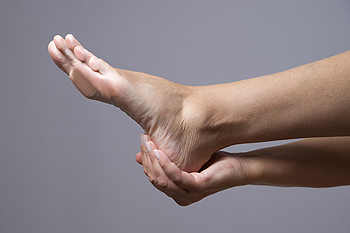Foot and Ankle Specialist
What Is a Plantar Wart?
Monday, 09 September 2019 00:00Patients who have had a plantar wart are familiar with the pain and discomfort it can cause. It is caused by human papillomavirus, which is known as HPV. It enters the body through small cuts in the skin on the feet, and will typically grow in the heel area. This virus lives in warm and moist environments, which can include public pools, shower room floors, and surrounding areas. A plantar wart is different than most warts because it grows into the heel instead of out. This happens as a result of the amount of pressure the heel endures while standing and walking. Some of the symptoms that are associated with this contagious condition can include heel pain, which can be severe upon arising in the morning, bleeding if it is scraped, and walking may also be affected. If you have a plantar wart, it is suggested that you seek the counsel of a podiatrist who has access to methods for proper removal.
Plantar warts can be very uncomfortable. If you need your feet checked, contact Don A. Shumway, DPM from Arizona. Our doctor will assist you with all of your foot and ankle needs.
About Plantar Warts
Plantar warts are the result of HPV, or human papillomavirus, getting into open wounds on the feet. They are mostly found on the heels or balls of the feet.
While plantar warts are generally harmless, those experiencing excessive pain or those suffering from diabetes or a compromised immune system require immediate medical care. Plantar warts are easily diagnosed, usually through scraping off a bit of rough skin or by getting a biopsy.
Symptoms
- Lesions on the bottom of your feet, usually rough and grainy
- Hard or thick callused spots
- Wart seeds, which are small clotted blood vessels that look like little black spots
- Pain, discomfort, or tenderness of your feet when walking or standing
Treatment
- Freezing
- Electric tool removal
- Laser Treatment
- Topical Creams (prescription only)
- Over-the-counter medications
To help prevent developing plantar warts, avoid walking barefoot over abrasive surfaces that can cause cuts or wounds for HPV to get into. Avoiding direct contact with other warts, as well as not picking or rubbing existing warts, can help prevent the further spread of plantar warts. However, if you think you have developed plantar warts, speak to your podiatrist. He or she can diagnose the warts on your feet and recommend the appropriate treatment options.
If you have any questions please feel free to contact our office located in Snowflake, AZ . We offer the newest diagnostic and treatment technologies for all your foot and ankle needs.
Read more about What Are Plantar Warts?






